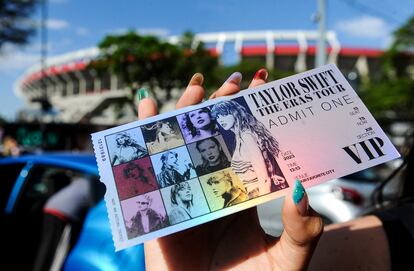Taylor Swift buoys sinking economy in Argentina
The pop superstar’s three concerts in Buenos Aires injected much needed foreign exchange into a country burdened by high inflation, low growth and political strife


We still don’t know what Taylor Swift thought about the famously boisterous Argentine fans after her first concert in Buenos Aires on November 9. The Rolling Stones, Iron Maiden and other big-name bands have left here impressed by the enthusiasm of their South American fans. We do, however, know that the billionaire supernova injected new life into the local economy just two weeks before presidential elections.
It’s a phenomenon that has already swept through the United States and Mexico. The 53 U.S. concerts added at least $4.3 billion to the country’s GDP, according to Bloomberg Economics. The Federal Reserve also noted how Swift’s concerts boosted tourism revenue in cities like Philadelphia. In Mexico, 180,000 people attended her concerts, producing a $61.5 million economic impact in just four nights, according to the local chamber of commerce.
Argentina is a different story. It’s one of 20 nations Swift will visit during her Eras Tour, which will conclude in November 2024. The International Monetary Fund says Argentina is mired in a recession and forecasts a 2.5% decline in the local economy this year. Inflation is a huge concern. According to BBVA Research’s October estimate, prices are projected to increase by 200% over 2023. This inflationary spiral is masking significant macroeconomic imbalances, including a historic fiscal deficit, a rapidly increasing money supply, and ongoing foreign debt negotiations. BBVA recently upped its estimate of Argentina’s fiscal deficit to 2.8% of GDP. The Treasury’s direct and indirect infusions of new currency are expected to surpass 4% of GDP this year.
No one is saying the 34-year-old singer’s concerts have aggravated Argentina’s inflation, unlike Beyoncé's concerts in Sweden that may have contributed to a 9.7% year-over-year price increases. Taylor Swift’s visit to Argentina seems to have had a positive effect on the economy, with locals posting joking comments on social media like “Taylor Swift came to revitalize the Argentine economy.”
An economic breather
Another sign of Argentina’s strange economic times are its 10 different official exchange rates. Despite the economic crisis, major shows always sell out there because of fluctuating dollar exchange rates, and the progressive devaluation of the local currency. “We can only spend money on a few little leisure activities,” said Victoria Leo Murias, a doctor in her thirties who likes to eat out at restaurants and go to concerts on weekends.
Swift fans from neighboring countries like Chile (where no concerts are scheduled) are flocking to the concerts in Buenos Aires to take advantage of the exceptionally affordable prices. The most expensive ticket is only about $150, compared to the hefty €589 ($630) fans paid to see her in Madrid next year.
Economists say the true impact of the pop diva’s visit is impossible to measure in a free-falling economy. “Any estimate would be pure speculation. It’s impossible in this economic context with all its uncertainty and informality to make any definitive statements,” said an economist from an international consulting firm.
Many of the local services surrounding Swift’s concerts are part of Argentina’s informal economy, which is hard to quantify as they are beyond the purview of local tax authorities. Airbnb shows 20,000 short-term rentals in Buenos Aires, which are now hard to find in the northern area of the Argentine capital where Swift will perform. These are going for over $200 a night, about 12 times the average rate.
Regular hotels say demand is way above normal. “Hotels in Buenos Aires are at full occupancy,” confirmed Argentina’s hotel association to Perfil newspaper. The association says hotel accommodations in the Argentine capital are less than a third of the cost of rooms in other major stops on Swift’s tour.
Swiftie fever has swept all of Buenos Aires, even its less glamorous areas. Jewelry stores in the Once neighborhood “are packed with fans looking for beads to make friendship bracelets,” said Julieta Scattini, a local journalist and Swift fan. The friendship bracelets are traditionally traded at concerts by die-hard Swifties.
Besides the coveted friendship bracelets, there are official concert T-shirts, sweatshirts, bags and other merchandise with prices ranging from $15-$60. The high prices have spawned a cottage industry of knockoffs. “It seems like every local entrepreneur, even traditional clothing stores, launched their own Taylor Swift collections. No one wants to be left out,” said Scattini.
The politicians
Two weeks before the next round of elections, politicians are also jumping on the bandwagon. The youth vote could be decisive in the presidential runoff between libertarian Javier Milei and Peronist Sergio Massa. The candidates themselves haven’t made any explicit mentions of Taylor Swift, but their supporters have capitalized on the media excitement. One group of avowed fans released a statement declaring, “Milei is Trump,” and urged other fans to do everything possible to stop him from wining. Although the presidential candidates refrained from commenting, conservative Horacio Rodríguez Larreta, the head of government for Buenos Aires, declared himself a Swiftie and asked his followers to create a Spotify playlist of their favorite songs.
After Swift’s final concert in Argentina on November 11, the main sources of entertainment will be the final political debates and the country’s ongoing economic woes. Massa’s platform is centered on social welfare programs and the suspension of specific taxes, like VAT on food and income tax, for much of the population. Milei will need to explain why he is distancing himself from earlier promises to dollarize the economy and offer alternative proposals. Perhaps the economic “Swift effect” will influence the plans of both presidential candidates.
Sign up for our weekly newsletter to get more English-language news coverage from EL PAÍS USA Edition
Tu suscripción se está usando en otro dispositivo
¿Quieres añadir otro usuario a tu suscripción?
Si continúas leyendo en este dispositivo, no se podrá leer en el otro.
FlechaTu suscripción se está usando en otro dispositivo y solo puedes acceder a EL PAÍS desde un dispositivo a la vez.
Si quieres compartir tu cuenta, cambia tu suscripción a la modalidad Premium, así podrás añadir otro usuario. Cada uno accederá con su propia cuenta de email, lo que os permitirá personalizar vuestra experiencia en EL PAÍS.
¿Tienes una suscripción de empresa? Accede aquí para contratar más cuentas.
En el caso de no saber quién está usando tu cuenta, te recomendamos cambiar tu contraseña aquí.
Si decides continuar compartiendo tu cuenta, este mensaje se mostrará en tu dispositivo y en el de la otra persona que está usando tu cuenta de forma indefinida, afectando a tu experiencia de lectura. Puedes consultar aquí los términos y condiciones de la suscripción digital.








































